Smooth traffic circulation around Delft
Strukton is working on the facilities required to be able to bring passengers even more quickly and safely from point A to point B.
The number of passengers taking the train each year is increasing and is expected to continue to do so over the coming years. A good sign, because the train still offers one of the most sustainable forms of travel. At the same time, this puts a demand on the routes between major cities and the connections within cities. As part of the High-Frequency Rail Transport Programme Rijswijk – Rotterdam, Strukton is working under contract to ProRail over the coming years on the facilities required to be able to bring passengers even more quickly and safely from point A to point B.
Operations on site commenced in November 2019. The last civil works are expected to be completed by the end of 2024.

The new Delft Campus station
The station in the South of Delft was completely renovated and converted to become the first energy-neutral station in the Netherlands. The station’s roof will consist of solar panels. In addition to being renovated, the station will also be given a new name: Delft Campus station.
Double track capacity
In the near future, passengers will no longer have to check the clock, the next train will pull up in a few minutes. Eight Intercity trains and six Sprinters an hour will run in each direction between The Hague Central Station and Rotterdam Central Station. The track capacity for freight traffic will also increase on this route. To achieve this, the tracks between Rijswijk and Delft Zuid will be doubled from two to four tracks. The signals between Delft Zuid and Rotterdam will also be improved.
Bridges across the Kerstanjewetering waterway
The railway bridge at the border between Rijswijk and Delft has made way for a bridge able to accommodate four tracks. The new bridge will have a clearance of 1.80 m, which will allow pleasure craft to easily pass under it.
New Rijswijk underpass
In Rijswijk, an underpass has been constructed to replace the ’t Haantje level crossing. This is safer and provides for better traffic circulation. The new underpass was located 250 metres to the north of the current level crossing. A railway access point for emergency services and railway contractors was constructed at the site of the current level crossing.
Solar cells roof
Strukton is responsible for building the roof, including solar cells and the connection to the power grid. An added benefit for passengers is that in the future they will no longer be exposed to rain. Lifts will also make the new Delft Campus station accessible to passengers with a disability. A safe connection between the west and east side of the station will be realised by constructing a new cycling and pedestrian tunnel with direct access to the platforms. The current side platforms will be replaced by two island platforms. In addition, Delft University of Technology, among others, will also be better accessible.
Local community as success factor
Naturally, due to its scope the project will impact passengers as well as local residents during construction. Yet everything possible will be done to limit any inconvenience to a minimum. For example, through smart phasing and a smart construction method, inconvenience to passengers at the Delft Campus station has been reduced from two years to six months. In addition, we will stay in constant communication with local residents and an information point will be set up.